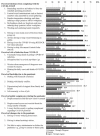COVID-19 Pandemic Fatigue and Its Sociodemographic, Mental Health Status, and Perceived Causes: A Cross-Sectional Study Nearing the Transition to an Endemic Phase in Malaysia
- PMID: 36901486
- PMCID: PMC10001764
- DOI: 10.3390/ijerph20054476
COVID-19 Pandemic Fatigue and Its Sociodemographic, Mental Health Status, and Perceived Causes: A Cross-Sectional Study Nearing the Transition to an Endemic Phase in Malaysia
Abstract
This study aimed to explore the socio-demographic characteristics, mental health status, and perceived causes of pandemic fatigue with COVID-19 pandemic fatigue among the general population of Malaysia. The data was collected online during the transition from the COVID-19 pandemic phase to the endemic phase in Malaysia from 1 to 30 April 2022. Sociodemographic data, Depression Anxiety Stress Scale-21 (DASS-21), perceived causes of pandemic fatigue, and the Fatigue Assessment Scale (FAS) were included in the survey. The chi-square test and a simple logistic regression analysis were used to identify predictors of pandemic fatigue. The completed survey (N = 775) included individuals aged 18 years or above [mean 31.98 (SD = 12.16)] from all states in Malaysia. Pandemic fatigue prevalence was 54.2%. Severe to extremely severe depression, anxiety, and stress symptoms were detected in 11.2%, 14.9%, and 9.1% of the participants, respectively. Younger age, non-Malay ethnicity, living alone, and higher income categories were significantly higher in the fatigued group. Higher DASS-21 scores on all domains were associated with higher FAS scores. Meanwhile, high scores for perceived tiredness from complying with the COVID-19 Standard Operating Procedure (SOP), perceived risk of infection from COVID-19, perceived hardship due to the pandemic, perceived public complacency during the pandemic, and perceived changes due to the pandemic were associated with a higher FAS score. This study provides valuable information for policymakers and mental health professionals worldwide on pandemic fatigue and its associated factors, including mental health status in Malaysia.
Keywords: COVID-19; anxiety; depression; pandemic fatigue; stress.
Conflict of interest statement
The authors declare no conflict of interest.
Figures
Similar articles
-
Perception towards E-learning and COVID-19 on the mental health status of university students in Malaysia.Sci Prog. 2021 Jul-Sep;104(3):368504211029812. doi: 10.1177/00368504211029812. Sci Prog. 2021. PMID: 34260295 Free PMC article.
-
Sleep quality, quality of life, fatigue, and mental health in COVID-19 post-pandemic Türkiye: a cross-sectional study.Front Public Health. 2024 Feb 23;12:1250085. doi: 10.3389/fpubh.2024.1250085. eCollection 2024. Front Public Health. 2024. PMID: 38463157 Free PMC article.
-
Perception of Health Conditions and Test Availability as Predictors of Adults' Mental Health during the COVID-19 Pandemic: A Survey Study of Adults in Malaysia.Int J Environ Res Public Health. 2020 Jul 30;17(15):5498. doi: 10.3390/ijerph17155498. Int J Environ Res Public Health. 2020. PMID: 32751459 Free PMC article.
-
Prevalence and Influencing Factors on Fatigue of First-line Nurses Combating with COVID-19 in China: A Descriptive Cross-Sectional Study.Curr Med Sci. 2020 Aug;40(4):625-635. doi: 10.1007/s11596-020-2226-9. Epub 2020 Aug 29. Curr Med Sci. 2020. PMID: 32767264 Free PMC article.
-
Prevalence and factors associated with depression, anxiety and stress in Malaysia during COVID-19 pandemic: A systematic review.PLoS One. 2023 Jul 20;18(7):e0288618. doi: 10.1371/journal.pone.0288618. eCollection 2023. PLoS One. 2023. PMID: 37471310 Free PMC article.
Cited by
-
Association of COVID-19 Infection with Sociodemographic, Anthropometric and Lifestyle Factors: A Cross-Sectional Study in an Older Adults' Population Aged over 65 Years Old.Diseases. 2023 Nov 9;11(4):165. doi: 10.3390/diseases11040165. Diseases. 2023. PMID: 37987276 Free PMC article.
-
The Influence of Changes in Daily Life Habits and Well-Being on Fatigue Level During COVID-19 Pandemic.Psychol Belg. 2024 Jul 18;64(1):85-107. doi: 10.5334/pb.1259. eCollection 2024. Psychol Belg. 2024. PMID: 39035472 Free PMC article.
-
Mental health during and after the COVID-19 pandemic - a longitudinal study over 42 months in five European countries.Eur J Psychotraumatol. 2025 Dec;16(1):2488700. doi: 10.1080/20008066.2025.2488700. Epub 2025 Apr 22. Eur J Psychotraumatol. 2025. PMID: 40260985 Free PMC article.
-
Post-COVID-19 condition symptoms among emergency department patients tested for SARS-CoV-2 infection.Nat Commun. 2024 Sep 30;15(1):8449. doi: 10.1038/s41467-024-52404-4. Nat Commun. 2024. PMID: 39349926 Free PMC article.
-
Adapting new norms: A mixed-method study exploring mental well-being challenges in dental technology education.PLoS One. 2025 Mar 25;20(3):e0320602. doi: 10.1371/journal.pone.0320602. eCollection 2025. PLoS One. 2025. PMID: 40132012 Free PMC article.
References
-
- Xu X.W., Wu X.X., Jiang X.G., Xu K.J., Ying L.J., Ma C.L., Li S.B., Wang H.Y., Zhang S., Gao H.N., et al. Clinical findings in a group of patients infected with the 2019 novel coronavirus (SARS-Cov-2) outside of Wuhan, China: Retrospective case series. BMJ. 2020;368:m606. doi: 10.1136/bmj.m606. - DOI - PMC - PubMed
-
- Global Research Collaboration for Infectious Disease Preparedness . COVID 2019 PHEIC Global Research and Innovation Forum: Towards a Research Roadmap. World Health Organization; Geneva, Switzeland: 2020. [(accessed on 15 November 2022)]. Available online: https://www.who.int/publications/m/item/covid-19-public-health-emergency....
-
- WHO WHO Director-General’s Opening Remarks at the Media Briefing on COVID-19 11 March 2020. [(accessed on 15 November 2022)]. Available online: https://www.who.int/director-general/speeches/detail/who-director-genera....
Publication types
MeSH terms
Grants and funding
LinkOut - more resources
Full Text Sources
Medical
Research Materials
Miscellaneous



